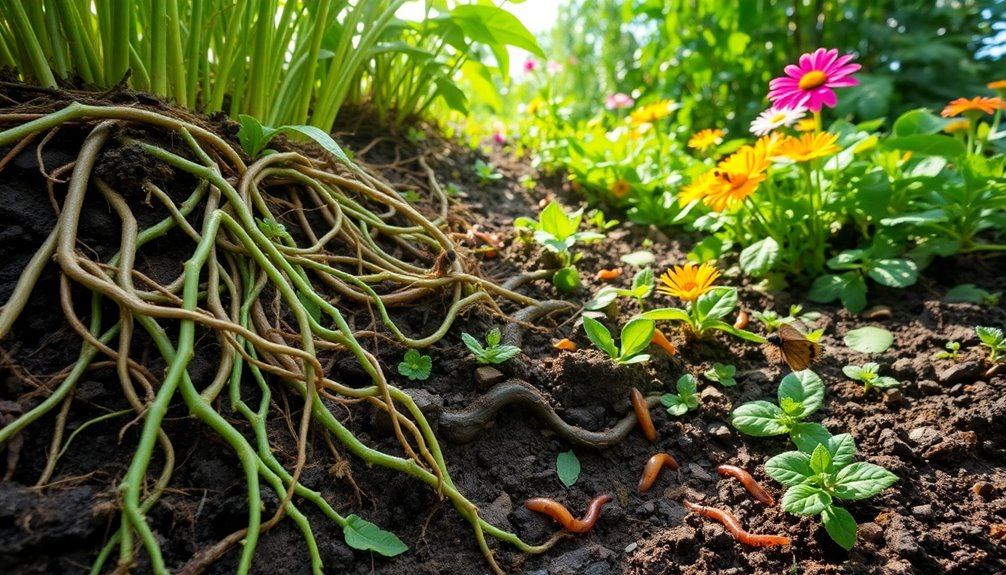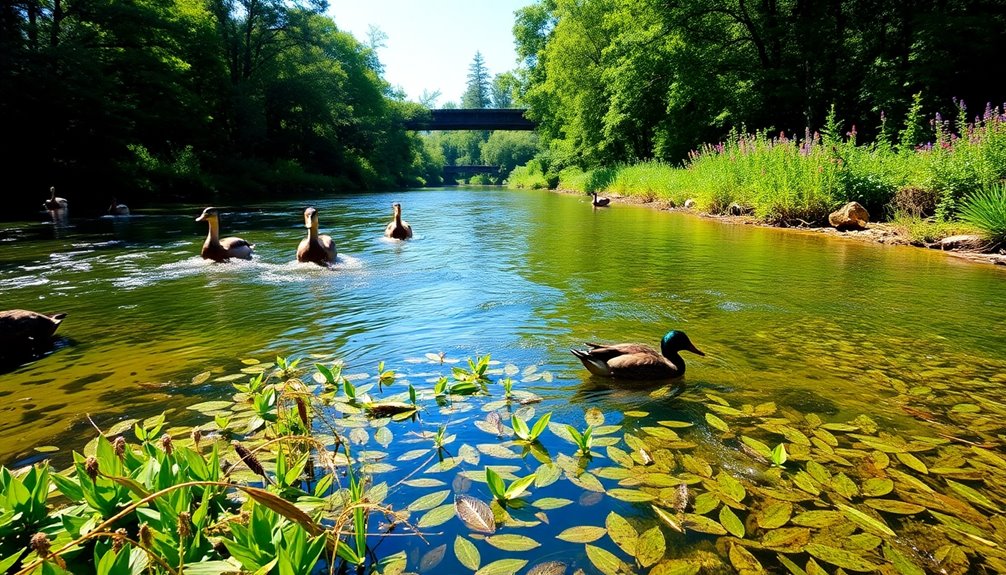Biodiversity supports essential ecosystem services that benefit you and everyone around. First, it aids nutrient cycling, improving soil health for better crop yields. Second, it purifies water by filtering pollutants, ensuring clean drinking water. Finally, biodiversity enhances resilience against environmental changes, helping ecosystems recover from extreme events. These services are crucial for your wellbeing and are intertwined with nature. There's so much more to discover about how these services impact our lives in various ways.
Key Takeaways
- Biodiversity enhances pollination services, with honeybees contributing significantly to food production by pollinating one-third of our crops.
- Diverse ecosystems improve water purification, filtering pollutants and maintaining clean water supplies for human consumption and agriculture.
- Healthy soil, enriched by diverse organisms, boosts nutrient cycling, leading to increased agricultural productivity and sustainable farming practices.
- Biodiversity supports flood control through wetlands, reducing damage from extreme weather events and protecting surrounding communities.
- High biodiversity areas exhibit greater resilience to climate changes, ensuring the stability of essential ecosystem services that support human well-being.
The Role of Biodiversity in Ecosystem Resilience

Biodiversity plays an essential role in enhancing ecosystem resilience, especially when you consider how diverse species interact with one another. When ecosystems boast a variety of species, they become more stable and adaptable, critical for overcoming challenges like climate change.
This increased biodiversity supports fundamental ecosystem services, including food production and water purification, which directly impact human wellbeing. For instance, forests and wetlands with rich species diversity recover more quickly from extreme weather events, ensuring the sustainability of our natural resources.
Additionally, diverse ecosystems provide climate regulation, acting as buffers against environmental variability. By fostering species interactions, biodiversity safeguards these indispensable services, allowing communities to thrive even in the face of disturbances.
Nutrient Cycling and Soil Health

Healthy ecosystems not only enhance resilience but also play an important role in nutrient cycling and soil health. By breaking down organic matter, decomposers like bacteria and fungi recycle fundamental nutrients, improving soil fertility for diverse plant species. Biodiversity boosts nutrient cycling, leading to healthier soils and increased food security. Additionally, healthy ecosystems provide essential services such as clean air, water purification, and pollination, further supporting agricultural productivity.
| Aspect | Contribution to Soil Health |
|---|---|
| Nutrient Cycling | Recycles fundamental nutrients |
| Species Richness | Improves soil structure |
| Organic Matter | Enhances soil formation |
Maintaining a variety of species is essential. Greater biodiversity guarantees effective nutrient recycling, promoting sustainable agricultural practices and resilience against environmental challenges. By valuing these ecosystem services, we can support our planet and secure a healthier future.
Water Purification and Availability

While you mightn't realize it, the intricate web of life in diverse ecosystems plays an essential role in purifying water and ensuring its availability.
Biodiversity enhances ecosystem services like water purification, where wetlands and forests filter pollutants, leading to improved water quality for everyone. Healthy ecosystems maintain groundwater levels through natural water retention processes, providing consistent supplies of clean water for communities and agriculture.
Riparian zones, abundant in plant diversity, act as buffers, absorbing excess nutrients and contaminants before they enter water bodies. In addition, biodiverse environments are resilient to climate fluctuations, sustaining water availability and quality during extreme weather events.
The economic value of these ecosystem services is immense, highlighting their importance for ecological balance and human livelihoods.
Examples of Ecosystem Services in Action

Ecosystem services are vividly illustrated through numerous real-world examples that highlight the benefits of biodiversity. Honeybees, essential pollinators, contribute to one-third of the food you eat, showcasing provisioning services. Diverse plant species in forests support nutrient cycling, returning crucial nutrients to the soil and enhancing agricultural productivity. Healthy wetlands provide regulating services by absorbing excess rainwater, reducing flooding, and offering billions in flood control value. Farms with diverse crop rotations yield up to 50% more produce than monocultures, emphasizing biodiversity's economic advantages. Greater biodiversity also boosts ecosystem resilience, allowing ecosystems to better withstand climate changes and stressors.
| Ecosystem Service | Example | Benefit |
|---|---|---|
| Provisioning Services | Honeybee pollination | Increased food supply |
| Regulating Services | Wetlands for flood control | Reduced flood damage |
| Nutrient Cycling | Forest decomposition | Enhanced soil health |
| Ecosystem Resilience | Diverse crop rotations | Improved recovery rates |
The Importance of Biodiversity Conservation

Biodiversity conservation is fundamental not just for the environment but also for your daily life. It supports critical ecosystem services that guarantee food production, clean water, and climate regulation, all essential for human wellbeing.
High biodiversity areas are more resilient to environmental changes, safeguarding resources like crops and water supplies. When biodiversity declines, so do key services such as pollination and nutrient cycling, threatening food security.
Additionally, diverse ecosystems enhance cultural services, offering recreational opportunities and spiritual fulfillment for communities. Engaging in biodiversity conservation not only fosters environmental health but also brings significant economic benefits, with ecosystem services valued in trillions of dollars annually.
Protecting biodiversity is a win-win for you and the planet.
Frequently Asked Questions
What Are the Three Ecosystem Services of Biodiversity?
Biodiversity offers essential ecosystem services that you mightn't always notice but greatly rely on.
First, it supports pollination, which helps produce food you eat daily.
Second, it facilitates nutrient cycling, returning crucial elements to the soil and boosting crop health.
Finally, it contributes to water regulation, ensuring clean water supplies and preventing floods.
What Are 3 Benefits of Biodiversity in an Ecosystem?
Biodiversity in an ecosystem offers several benefits that you can appreciate daily.
First, it enhances pollination, ensuring your food crops thrive.
Second, it aids in nutrient cycling, helping maintain healthy soil for your gardens.
Finally, diverse ecosystems improve water regulation, providing clean water for you and your community.
What Are the 3 Different Types of Biodiversity in an Ecosystem?
You can identify three main types of biodiversity in an ecosystem: genetic diversity, species diversity, and ecosystem diversity.
Genetic diversity refers to the variety of genes within a population, which helps species adapt and survive.
Species diversity measures the number of different species in a habitat, essential for ecosystem functionality.
Finally, ecosystem diversity encompasses the variety of habitats, each playing a role in supporting life and maintaining ecological balance.
What Are 3 Ways Biodiversity Is Crucial to Us?
Biodiversity's essential for your daily life in many ways.
First, it supports food production by ensuring pollination and nutrient cycling, which keeps your meals diverse and nutritious.
Second, healthy ecosystems control floods and purify water, protecting your home from extreme weather.
Finally, biodiversity enhances mental well-being by providing recreational spaces and a connection to nature, enriching your quality of life.
Without it, you'd face challenges in food security and environmental stability.
Conclusion
To sum up, biodiversity is essential for maintaining ecosystem services that directly benefit us, like nutrient cycling and water purification. Did you know that ecosystems with higher biodiversity can produce up to 50% more food than those with low diversity? By conserving biodiversity, you're not just protecting wildlife; you're ensuring a healthier planet and a more sustainable future for yourself and generations to come. It's clear that our well-being is intertwined with the richness of nature around us.









